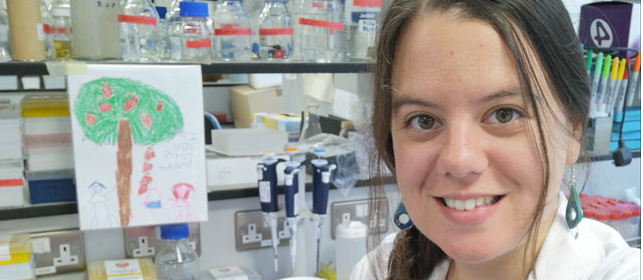July 15, 2019
Anne-Marie Labandera Nadeau: Passion, Drive, and Excellence in the Biological Sciences
It is rare that you encounter as accomplished a student as Anne-Marie Labandera Nadeau. Her accomplishments are impressive and varied, and give a clear indication of her outstanding work ethic as well as her passion for the Bioloigcal Sciences. The many awards Anne has received include:
Leverhulme Trust Early Career Fellowship
EMBO Long-Term fellowship
University of Calgary Silver Anniversary Fellowship
Alberta Innovates Technology Futures Graduate Scholarship
Queen Elizabeth II Graduate Scholarship
Jake Duerksen Memorial Scholarship
Queen Elizabeth II Graduate Scholarship
Department of Biological Sciences Award for Academic Excellence
Driven by her love for the Biological Sciences, Anne-Marie has followed an academic and professional career that is fueled by her interest in the natural world. Her journey has led her to many successes, both in her current field of research and teaching throughout her academic career. Her research focuses on how plants perceive different environmental signals and how they translate these signals to perform the proper responses to this stimuli. In particular, Anne-Marie is interested in studying how these plants can detect a lack of oxygen, for example in the case of flooding, and the response they have to these environmental factors. Her favorite aspect of this research is to design and execute experiments to try and answer these complex questions.
Beginning her academic journey at the Universidad de la República in Uruguay, Anne-Marie became interested in attending the University of Calgary after a visit in 2010, when she fell in love with the city of Calgary. Anne-Marie was completing a thesis revolving around protein phosphatases from Mycobacterium tuberculosis at the Universidad de la República, and wanted to continue to pursue her passion. It was at this time that she came into contact with Dr. Greg Moorhead of the University of Calgary. Dr. Moorhead’s lab focuses on characterizing and understanding the functions of different human and plant protein phosphatases, which fit well with Anne-Marie’s previous experience. It was an excellent match and one that led Anne-Marie to attend the University of Calgary and to transfer into her PhD after a year spent in her Master’s program.
Anne-Marie feels that compared to other disciplines “often times, plant sciences are wrongly considered secondary or “less important” or “less urgent”, which leads to less funding opportunities. More recently however, the public is more aware of the importance of food security, especially due to drastic climate change. Hopefully this will lead to an increase in worldwide funding. It is important that as scientists, we communicate the significance of our research in an effective way.” This shift in public opinion in important because these issues can have major effects on the Albertan climate/landscape, a point Anne-Marie makes in the statement, “In Alberta, flooding is one of the main natural disaster and has enormous impact on agriculture. Since this problem will continue in the future, it is extremely important to do research in this area.” Fundamental research in plant sciences (understanding the molecular basis of plants) is central to enabling progressive change, while trying to mitigate the consequences of flooding.

Anne-Marie Labandera Nadeau
When asked about her PhD experience Anne-Marie is positive and honest, saying that “like every PhD degree, there were ups and downs along the way. Overall my experience was very positive. From the beginning, the lab was very welcoming and the grad students in the department were a big support for me. I found several mentors across the department who were, and still are, extremely important for my professional development.” Speaking about her experience as a Teaching Assistant, Anne-Marie feels fortunate to have been given the opportunity to teach, saying “I got to TA from the beginning and mentored undergraduate students in the lab. These experiences don’t happen everywhere and although time consuming, I found them to be very enriching personally and professionally.” These opportunities fostered a sense of community for Anne-Marie, and made her feel welcomed and appreciated at the University of Calgary.
Anne-Marie speaks to how important building a community is when asked about her experience as a graduate student. She explains that “For me, as a student, it was essential to communicate with other grad students and PIs from the department of Biological Sciences. Grad school can easily become lonely and stressful. It is important not to be isolated. Also, by talking to other scientists that work in other areas of expertise, we often came up with new ideas for our research and obtained valuable advice.” Through the community that Anne-Marie built within the Biological Sciences she was able to better feel at home, while maintaining a healthy work and life balance to reach her personal goals. These relationship building skills are critical when completing a PhD or any other challenging academic pursuit, and contributed to Anne-Marie receiving numerous teaching scholarships as she helped other students on their own academic paths. Anne-Marie received the Sharon Wilkens Teaching award for Best Teaching Assistant of the 2012/2013 Academic year, and received the Teaching Assistantship Award every semester of her Teaching Assistant career. Each of these awards are difficult to obtain, shows how deeply Anne-Marie cared for the development of other students within the Biological Sciences Department.
A driven and accomplished person, Anne-Marie has always found time to give back to the Biological Sciences community through her teaching and mentorship. It is this natural sense of empathy and drive for excellence that has made her so successful, and what will add to her successes in the future. With such accomplished minds working towards similar goals, the future of the Biological Sciences is not only in good hands, but has an extremely bright future.
An article written by Glynndon Dobson
